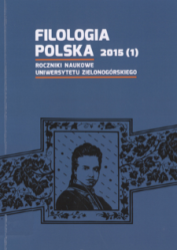The afterlife – nonexisting or unknowable? The interpretation benefiting from translation. A case study of Jan Kochanowski’s Lament X [Tren X]
Keywords
Abstract
The idea of the research is to state how the translation of a poem may influence its interpretation. The excerpt of Lament X [Tren X] by Jan Kochanowski was studied for this purpose. The analysis is focused on the concept crucial to the poem, which is space, side, direction – its etymological meaning and philosophical consequences resulting from it. Then, the original text is compared to modern English translations, especially to the unconventional work of Barańczak and Heaney. The comparison is made by using hermeneutic methods in translation studies. The study shows that translation is not separated from the Lament X [Tren X], moreover, it might be helpful in understanding it, hence the interpretation benefits from the translation. As a result, the author suggests a new interpretation of a poem.
References
LITERATURA CYTOWANA
Barańczak S., Ocalone w tłumaczeniu, Poznań 1992.
[Google Scholar]
Borowski A., Cierpieć po ludzku, czyli jeszcze o „Trenach”, [w:] Lektury polonistyczne. Jan Kochanowski, Kraków 2001.
[Google Scholar]
Boryś W., Słownik etymologiczny języka polskiego, Kraków 2005.
[Google Scholar]
Gadamer H. G., Lektura jest przekładem, [w:] Współczesne teorie przekładu. Antologia, red. P. Bukowski i M. Heydel, Kraków 2009.
[Google Scholar]
Jan Kochanowski, Laments, trans. S. Heaney, S. Barańczak, Faber and Faber 1995.
[Google Scholar]
Kochanowski J., Pieśni, oprac. L Szczerbicka-Slęk, Wrocław 1988.
[Google Scholar]
Kochanowski J., Treny, oprac. J. Pelc, Wrocław 1969.
[Google Scholar]
Oxford Dictionary of English, wyd. 2, Oxford University Press 2010.
[Google Scholar]
Pirie D. P. A., Wymiar tragiczny w „Trenach Jana Kochanowskiego”, [w:] Jan Kochanowski. Interpretacje, red. J. Błoński, Kraków 1989.
[Google Scholar]
Pisarze polscy o sztuce przekładu 1440-2005. Antologia, oprac. E. Balcerzan i E. Rajewska, Poznań 2007.
[Google Scholar]
Reczek S., Podręczny słownik dawnej polszczyzny, Wrocław 1968.
[Google Scholar]
Słownik polszczyzny Jana Kochanowskiego, t. 4, red. M. Kucała, Kraków 2008.
[Google Scholar]
Sokolski J., Staropolskie zaświaty, Wrocław 1990.
[Google Scholar]
Steiner G., Ruch hermeneutyczny, [w:] Współczesne teorie przekładu. Antologia, red. P. Bukowski i M. Heydel, Kraków 2009.
[Google Scholar]
Stolze R., Tłumaczenie jako proces ewolucyjny, [w:] Współczesne teorie przekładu. Antologia, red. P. Bukowski i M. Heydel, Kraków 2009.
[Google Scholar]
Wilczek P., Dyskurs – przekład – interpretacja, Katowice 2001. Ziomek J., Literatura odrodzenia, Warszawa 1987.
[Google Scholar]
Preview
Downloads
Published
How to Cite
Issue
Section
Categories
Copyright & License

This work is licensed under a Creative Commons Attribution-NonCommercial-NoDerivatives 4.0 International License.
Copyrights (a). In principle, authors who are not employed by the University of Zielona Góra retain the copyright, including publishing rights to the articles, without restrictions.
Copyrights (b). In principle, authors who are employed by the University of Zielona Góra, do not retain the copyright, including publishing rights to the articles. In such cases the copyright holder is the University of Zielona Góra.
Print ISSN
2450-3584-
Abstract103










































